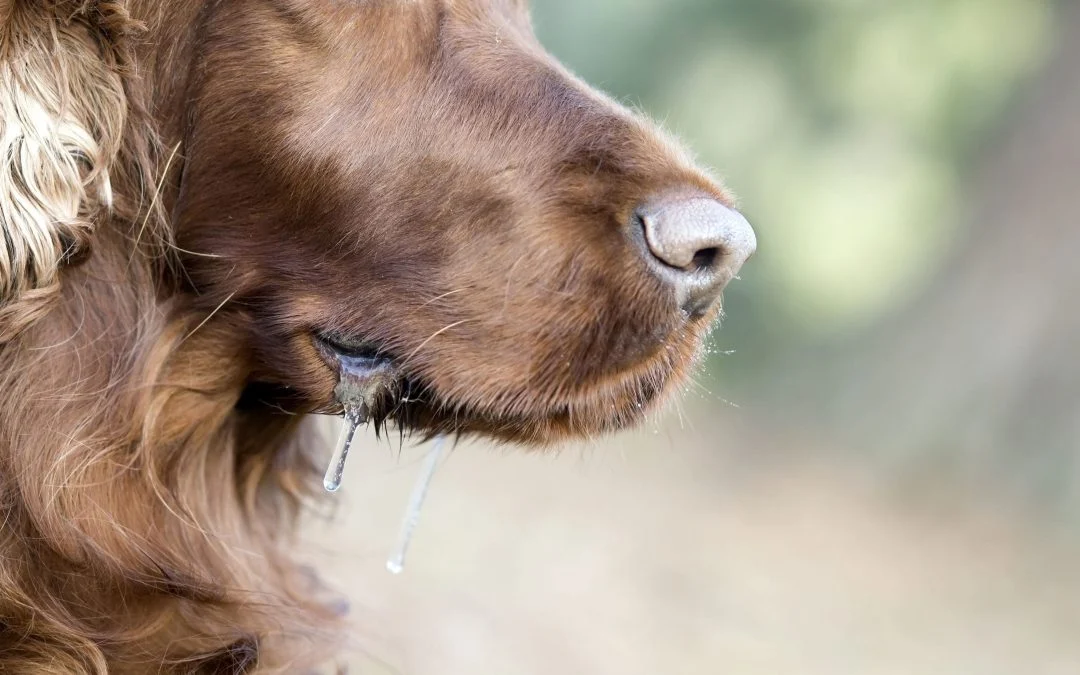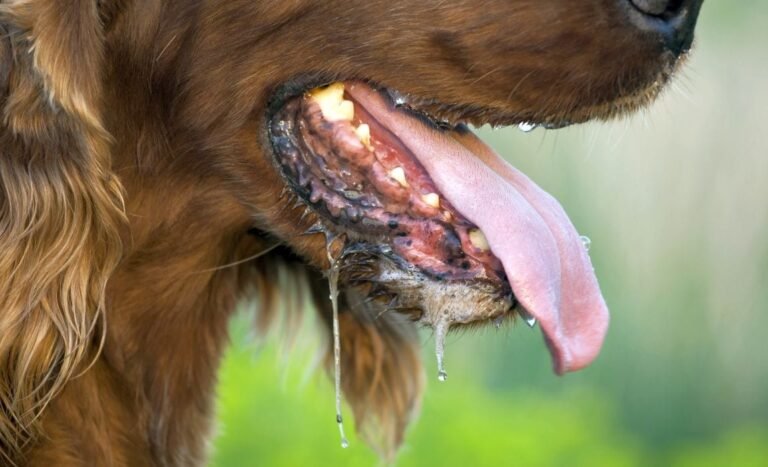Home Remedies for Dog Drooling: Drooling is a common occurrence in dogs and can occur for a variety of reasons.
Table of Contents
While some dogs shed more than others, all dogs will drill at some point in their lives. Some common causes of dog drooling include:
- Teething
- Eating or drinking
- Waiting for food
- Exercise
- The heat
- Medicines
Dogs also shed when they are nervous or excited. Although drooling is usually not a cause for concern, if you notice that your dog is drooling more than usual or has drool along with other symptoms, it is important to consult your veterinarian.
There are a few things you can do at home to help reduce your dog’s drooling. Try to keep your dog’s head and neck dry, as wetness can increase drooling.
Also Read: Puppy Crying? 7 Strong Reasons Your Puppy May Be Crying
- If your dog is drooling profusely, you can try giving them ice chips or a frozen Kong toy to help keep them occupied and distracted.
- You can also try feeding your dog small meals throughout the day, as large meals sometimes cause dogs to spit up.
- Finally, if your dog is panting due to excitement or anxiety, try to provide them with a calm, quiet environment and avoid situations that trigger their drooling.
5 Best Home Remedies for Dog Drooling

Drooling is one of the most common problems dog parents face. While it may not seem like a big deal, dog drooling can actually be quite embarrassing. Not only is it annoying, but it can also be a sign of a more serious health problem.
Drooling can be caused by many different things, including anxiety, excitement, heat, and a foreign body in the mouth. If your dog is drooling more than usual, it’s important to take him to the vet to rule out any underlying health problems.
In the meantime, there are a few things you can do to help control your dog’s drooling. Here are the six best home remedies for dog drooling:
1. Coconut oil and herbal tea rinses
A lot of dogs drool, and it can be a real pain to deal with. Fortunately, there are a few home remedies that can help. One popular option is to give your dog coconut oil or herbal tea rinses. Both of these options can help to reduce drooling and keep your dog’s mouth healthy.
Coconut oil is a natural anti-inflammatory, so it can help to reduce inflammation in the mouth. Herbal tea rinses can also help to soothe the mouth and reduce inflammation. Just be sure to use a mild herbal tea like chamomile or lavender, as strong teas can irritate the mouth.
You can give your dog these rinses once or twice a day, and you should see a noticeable difference in drooling within a few days.
2. Ginger tincture or pill
Ginger is a natural remedy for many types of stomach problems including nausea and vomiting. For dogs, ginger can help control drooling by reducing saliva production.
You can give your dog ginger in tincture or pill form. If you choose to give him a tincture, dilute it with water before giving it to your dog.
Ginger can be used in the form of a tincture or pill, and it works by helping to calm the stomach and relieve nausea. It is also a natural anti-inflammatory, so it can help to reduce swelling in the throat and mouth.
If your dog is drooling excessively, talk to your veterinarian about whether ginger might be a good option for them.
3. Doggy bibs/bandana
If you’re tired of cleaning up your dog’s drool, consider using a doggy bib or bandana. This helps catch the drool before it hits the floor.
Doggy bibs or bandanas are a home remedy for dog drooling that many pet owners swear by. The theory is that the bib or bandana will catch the drool before it has a chance to get on your clothes or furniture.
Some people even use them as a training tool, teaching their dogs to associate the bib with not drooling. There are a few things to keep in mind if you’re considering using a bib or bandana as a home remedy for dog drooling.
- First, make sure that the bib or bandana is large enough to catch all the drool.
- Second, be prepared to wash the bib or bandana frequently, as it will likely get wet quickly.
- And finally, keep in mind that this home remedy may not work for all dogs. If your dog is a heavy drooler, you may need to try a different remedy.
4. Brushing controls drooling
Regular brushing can help control your dog’s drooling. This is because it helps your dog get rid of spilled food or other particles.
5. Lemon extract
Adding a few drops of lemon juice to water can also control dog drooling. Lemon helps to dry the mouth and reduce the amount of saliva produced.
Adding a few drops of lemon juice to your dog’s water bowl can help to control drooling, as lemon is a natural astringent. This home remedy is safe for dogs of all ages and can be used as needed to help control drooling.
Just be sure to use fresh lemon juice, as the citric acid in lemon can be irritating to your dog’s skin if used in concentrated form.
6. Examining your dog’s mouth for oral foreign bodies
If your dog is still drooling profusely, it’s important to take him to the vet to rule out any foreign bodies that may be causing the problem. Your vet will be able to thoroughly examine your dog to determine if anything is stuck in his mouth that could be causing the drooling.
If you’re dealing with a dog that drools profusely, try one of these home remedies. If the problem persists, be sure to take your dog to the vet to rule out any underlying health issues.
What To Do if Your Dog Drools Excessively?
We all know that dogs bark. This is the truth of life. But what do you do when your dog drools excessively? Here are some tips to help you deal with a drooling dog.
First, it is important to understand that excessive drooling is a sign of a health problem. If your dog is drooling more than usual, it’s a good idea to take him to the vet to rule out any medical causes.
Once you’ve ruled out any medical causes, there are a few things you can do to help your drooling dog.
Here are some tips to help you deal with a drooling dog:
- Try to keep your dog’s head up. This helps keep the drool from running down his face.
- Wipe your dog’s face frequently with a clean cloth.
- Give your dog plenty of opportunity to drink water.
- If your dog is still drooling profusely, you may need to feed him small meals more often.
- You can also try giving your dog a chew toy to help keep his mouth busy.
- If all else fails, you may need to consult a veterinarian about medications that can help reduce your dog’s drooling.
Hope these tips help you deal with your drooling dog. Remember, if you are ever concerned about your dog’s health, always consult a veterinarian.
What are the Causes of Excess Drooling in Dogs?
Dogs drool. This is the truth of life. But what do you do when your dog drools excessively? First, it’s important to understand that some drooling is normal. Dogs have long tongues and lots of saliva, so expect a little drooling. But if your dog is drooling more than usual, it could be a sign of a medical problem.
There are a few different medical conditions that can cause excessive drooling in dogs. One is called megaesophagus, a condition that affects the esophagus, the tube that carries food from the mouth to the stomach. Dogs with megaesophagus have difficulty swallowing, so food and saliva accumulate in the esophagus and eventually spill out of the mouth.
Another condition that can cause excessive drooling is called pica. Pica is a compulsion to eat non-food objects such as dirt, rocks or sticks. Dogs with pica drool more because they are trying to swallow non-food items.
If your dog is drooling profusely, it’s important to take him to the vet to find out what’s causing it. Excessive drooling can be a sign of a serious medical condition, so it’s important to get diagnosed and treated as soon as possible.
Conclusion
The purpose of this article was to explain the causes and home remedies for excessive dog drooling. As a responsible pet parent, you must ensure that your dog’s needs are met and that he or she receives all of the care and attention required for a happy life.
It is also critical that we take our dog’s health seriously, so if their excessive salivation persists even after trying these methods, be sure to take them in for a check-up at the vet as soon as possible so that they can determine what is causing this problem in your pup and provide them with proper treatment if necessary.

